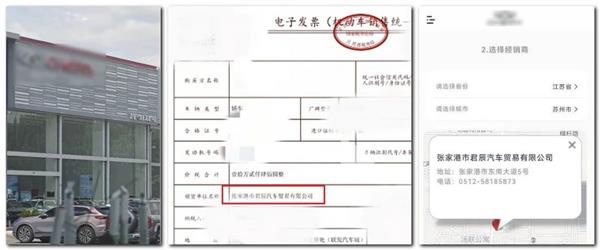Recently, 'Shanghai Traffic Radio' received complaints from car owners regarding a certain brand's 4S store in Qingpu, facing difficulties in vehicle delivery and registration. When they reported to the official hotline, they received a response stating 'no such store found.' Unlike previous cases where 4S stores closed due to inventory issues or financial troubles, this store had exited the brand's sales network as early as April 2024. However, it continues to operate under its original name, effectively functioning as an 'unlicensed operator.' For the past 15 months, it has been a 'fake 4S store.' With the 'fake 4S store' boldly selling cars while facing operational crises, questions quickly arise: How can car owners protect their rights at a 'fake 4S store' where they cannot receive their vehicles? Why has the manufacturer not detected the store's continued operation 15 months post-withdrawal? Why have legitimate 4S stores nearby not reported this and allowed it to confuse customers and compete for business? Are there other similar 'fake 4S stores' operating? How do they conduct their business? Through this incident, some changes in the industry are beginning to emerge.
1. Withdrawal of 4S Stores Without Exit from the Market
The complaint involved the 'Shanghai Hansheng Store.' Car owner Ms. Chen indicated that the contract stipulated vehicle delivery within a week, but the store kept delaying. Ms. Wu eventually received her vehicle, but the vehicle registration certificate was still mortgaged to a creditor, preventing her from registering the car. The official hotline stated that the 'Shanghai Hansheng Store' had withdrawn from the network in April 2024 and thus they were unaware of the current operational status or responsible party. Reporters from 'Shanghai Traffic Radio' visited the store, which was designed and decorated like a normal 4S store. When inquiring about the store's qualifications, staff claimed it was a manufacturer-run store that could also provide after-sales service. However, the purchase invoice provided to consumers revealed that the vehicle was registered to an authorized 4S store located in Zhangjiagang, a common tactic among secondary dealers. This confirmed that the store's real identity was that of a car trader. Car owners expressed that this chaotic relationship made it even harder to protect their rights; with the brand's official channels unable to locate the store, and the purchase invoice from another 4S store, they remained in the dark about who was responsible. Currently, they cannot receive their vehicles, and the store has almost 'vanished,' with negotiations relying solely on the store's goodwill, and lawsuits lacking complete information, leaving them feeling helpless.
2. Reselling Inventory Cars and Cross-Region Arbitrage
These types of stores acquire their inventory from nearby authorized 4S stores. However, due to their 'imposter' appearance, their advantages are even greater. A significant premise is that 4S store inventories are at an all-time high, prompting warnings from various automotive circulation associations. Incomplete statistics indicate that some luxury brand inventory ratios exceed 2.7, and some domestic brands even exceed 4.0, leaving dealers hovering on the 'death line' with a constant supply of discounted inventory. Since last year, car traders have been buying and selling large quantities, earning substantial profits through cross-region arbitrage. Consequently, some pressured 4S stores have chosen to withdraw from the network and engage in reselling business. The benefits are evident: they are no longer under the constraints of manufacturers and can freely design their sales policies. For instance, the 'equivalent trade-in' offer is something no authorized 4S store can provide. Furthermore, compared to other car traders, these withdrawn 4S stores maintain their original location and staff, making them appear trustworthy to car owners. Thus, they can exploit the same discount space more creatively, ultimately retaining more profit. Additionally, they have unique resource connections, making cooperation with former colleagues in the industry more efficient. This explains why, for authorized 4S stores, the price and volume of inventory, as well as payment cycles, can be discussed more freely. It can be said that maintaining amicable relations and avoiding conflicts has allowed many withdrawn 4S stores to survive for a while. However, should any operational issues arise and car owners start to investigate, such blatant illegal operations cannot withstand scrutiny.
3. Manufacturer Oversight: Late but Necessary
After 'Shanghai Traffic Radio' reported this incident, the 'Shanghai Hansheng Store' removed its presence from platforms like Douyin and Gaode Map. However, considering the duration of its fraudulent operations lasting 15 months, car owners generally believe that the brand's interests have been severely harmed. Primarily, after the withdrawal of Shanghai Hansheng Automobile, it continued to use brand logos and operate under the guise of a 'brand 4S store,' which constitutes confusion as defined in Article 6 of the 'Anti-Unfair Competition Law,' presenting serious infringement issues. Previously, some independent repair businesses were sued by manufacturers for improperly using brand logos. From the perspective of car owners, ensuring compliance in sales channels is a necessary obligation for companies and a vital protection of consumers' right to information. The phenomenon of 'withdrawn 4S stores illegally selling cars' must be curtailed. Furthermore, new car sales invoices issued by unauthorized stores usually do not qualify for the manufacturer's original warranty and rights of the first owner. Shanghai Hansheng Automobile's claim of 'manufacturer direct sales with after-sales service' undoubtedly disrupts the establishment of the manufacturer's after-sales system. The behavior of 'picking up cars in different locations' is also a violation of cross-region sales regulations. Currently, some deceived users have reported that the car company has contacted them, indicating they will assist users in handling subsequent matters. It is important to note that 'success is built on reputation, and failure is also rooted in reputation.' In an increasingly competitive automotive market, service strength and cohesion towards car owners are as crucial as product strength.
Fake 4S Store in Shanghai Continues Operations Despite Withdrawal from Sales Network

Images


Share this post on: